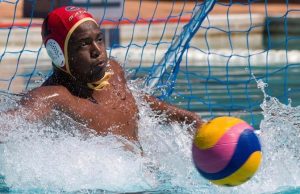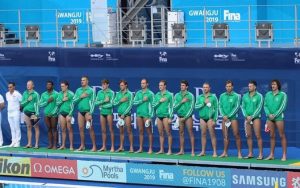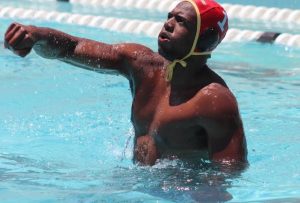Lwazi Madi – The afternoon in the pool that led to a decade of exellence
At 11 years old, Lwazi chose his sporting path unconsciously in the blazing heat. 38 degrees is all it took for him to snub cricket trials for swimming after just learning the art a few years prior. After swimming trails, he got coerced to water polo trials where one sentence would change his life.
“Who wants to play keeper?”
Right there and then, Lwazi had cracked it. He had found the cheat code. He could cool down in the heat and compete without doing too much swimming, but what he didn’t know was the cat-like reflexes that he possessed would coincidentally take him around the world as a goalkeeper for the South African water polo team.
Growing up, many black South African kids had black superheroes they looked up to in the sport. In football, many (myself included) looked up to Benni McCarthy. In rugby, there is Siya Kolisi. But the lack of black water polo players ironically led Lwazi to a cricket all-time great.
“The players that are of colour are extremely minimal especially in the sport so I kind of would adopt personalities and mental aspects of other professions to use to my advantage. So I really liked Makhaya Ntini.

“He was a hardworking guy and he established himself in a white renowned sport as a person of colour and I thought I could do the same” Lwazi said.
Politics and sport in South Africa are hugely intertwined and as a young black player in a predominately white sport, Lwazi had to navigate through this. What shocked me, however, was how observant he was of his surroundings during his first trip representing his province at 12 years old.
When he got in the squad he admitted to me that he found it odd that he made the team in the first place.
“I was like it’s really weird because I didn’t have the best trails so I don’t understand how I made the team, but ok.”
These are the first signs of a competitor. Nothing is ever enough. A true athlete always believed they can go to the next level, so it’s understandable for him to think that.
However, that first under 13 provincial tournament showed him the “progressive” structures that were put in place in water polo in South Africa to try and provide equal opportunities for all. He started noticing that each province had a specific number of black players in their team.

“I was like it is a bit weird that there’s a specific amount but maybe I am overlooking it. Then it’s got to our first game, they kept saying this player needs to play x amount more minutes and I was like “ok then, there’s something horribly wrong.
“That was quite demoralizing because it showed that you could work hard but never really know if you’ve made the team as a person of colour because there’s such a limit with the people that are playing already and you don’t know whether you there on merit so that drove me to work harder,” he says.
The truth is, not enough dialogue is happening to look at ways of how selection targets in sport affect black players mentally. This is a constant inner conflict they find themselves in daily.
That system is something that bothered him as an athlete. He probably felt that he did not qualify as he had the same opportunities as his white teammates because of his upbringing. This inner conflict also led to Lwazi boycotting provincial water polo because he didn’t agree with it. This was because, at the time, he was simply too young to understand the concept.
The relationship between aquatics and the black community needs some historical context. Under the Apartheid regime, black people in South Africa weren’t exposed to swimming pools. Swimming was a luxury for the whites in the suburbs. This is where the cycle starts. It’s impossible to create a generation of black swimmers when swimming wasn’t necessarily available to them.
I know plenty of black friends who’s first swimming experience was at a “Model C” school. This experience of learning how to swim and struggle would see black people be subject to stereotypes that “black people can’t swim”.

Even though black people have established their swimming ability in a sport like water polo. They still face certain stereotypes in the positions they play, especially at the junior and high school level.
“Players of colour were generally slower than the others (at junior level) and it was because they weren’t fixated on swimming at a young age. They were generally slower so those players were always put in the centre back position and that’s the person who marks the centre forward and always the last line and they swim the least distance.
Another aspect that hinders the involvement of black players in water polo is the amount of money that players need to pay to play. This is even when representing your country or province. To allow players to go on tour, they have to fork out like R10 000 or more for a tour. An aspect of the sport that only allows the privileged to compete in. Some kids simply can’t afford to pay that money, especially at two weeks notice, which Lwazi says is when Swim South Africa notifies them.
This is why Lwazi understands the importance of his role in this sport as a pioneer for many black kids trying to find their superhero.
With the pandemic, Lwazi has fully thrown himself at his Masters in Sports Science and his research in the psychological side of the sport in development, he knows what it takes to reach the highest level. 2021 is also a big year for him as he looks to achieve his spot to represent South Africa at the Olympics.
I doubt Lwazi will ever look back and wonder how his life would’ve turned out if he stayed on that cricket pitch.